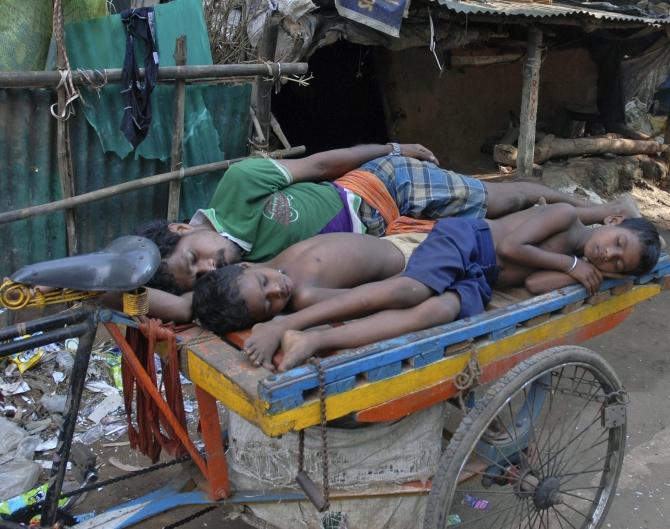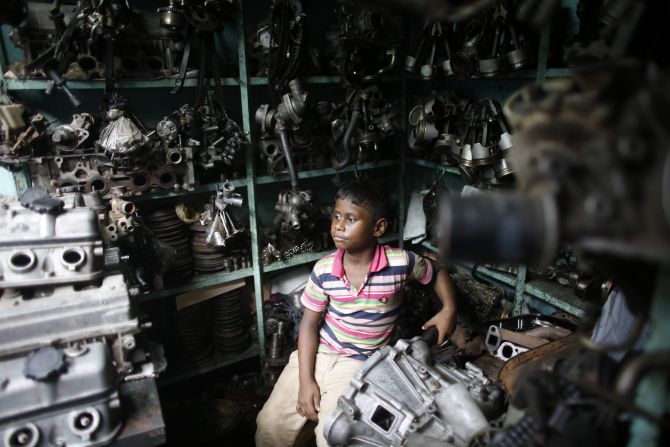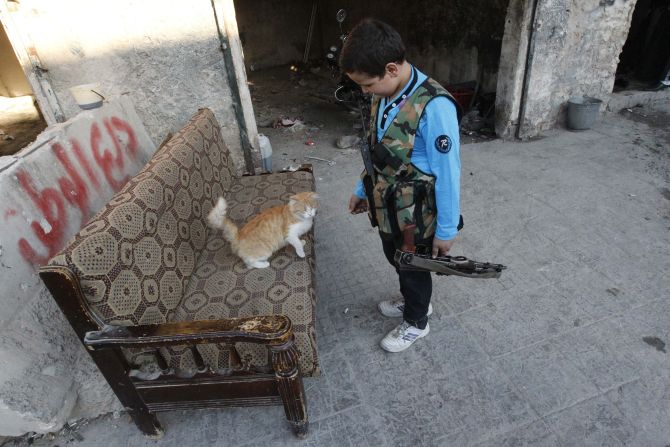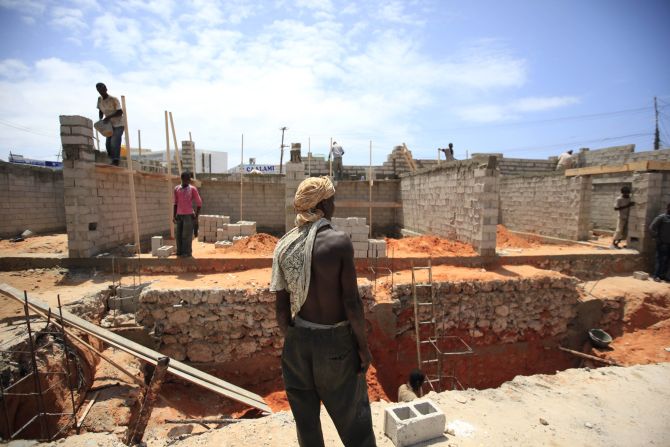 | « Back to article | Print this article |
India tops world slavery index
While Asia and Africa are home to the vast majority of modern slaves, no continent is free from modern slavery, says the Global Slavery Index.
About 14 million Indians are living in conditions of modern-day slavery, nearly half of 30 million across the world, according to the first Global Slavery Index published on Thursday.
The Global Slavery Index 2013, which surveyed 162 nations, was compiled by Australia-based rights organisation Walk Free Foundation using a definition of modern slavery that includes debt bondage, forced marriage, trafficked into brothels and the use of children in the military.
The Foundation's estimate of 29.8 million slaves worldwide is higher than other attempts to quantify modern slavery. The UN estimates almost 21 million people are victims of forced labour.
According to the index, the prevalence of modern slavery is highest in; Mauritania, Haiti, Pakistan, India, Nepal, Moldova, Benin, Cote d’ivoire, the Gambia, Gabon
However, when considered in absolute terms, the countries with the highest numbers of enslaved people are: India, China, Pakistan, Nigeria, Ethiopia, Russia, Thailand, Democratic Republic of the Congo, Myanmar, Bangladesh.
Taken together, these ten countries account for 76 per cent of the total estimate of 29.8 million enslaved people.
While Asia and Africa are home to the vast majority of modern slaves, no continent is free from modern slavery.
Click NEXT to read further...
'Highest numbers of people enslaved in India, China, Pakistan'
India (13,956,010), China (2,949,243), Pakistan (2,127,132) and Nigeria (701,032) have the highest numbers of people enslaved, the rights group claimed.
Together with six other countries, they account for three-quarters of the total estimated number of people enslaved worldwide, it said.
India:
The global slavery index says that the world’s second most populous country, India, with a population of over 1.2 billion people, exhibits the full spectrum of different forms of modern slavery, from severe forms of inter-generational bonded labour across various industries to the worst forms of child labour, commercial sexual exploitation, and forced and servile marriage.
The India country study suggests that while this involves the exploitation of some foreign nationals, by far the largest proportion of this problem is the exploitation of Indians citizens within India itself, particularly through debt bondage and bonded labour, says the global slavery index.
Internally trafficked men, women and children make up significant shares of the workforce in construction, textiles, brick making, mines, fish and prawn processing and hospitality.
Sexual exploitation of Indian women, men, transgender people and children within India, is widespread, the report says.
Enforcement of laws criminalising modern slavery is inconsistent, and the complicity or interference of government officials has been widely reported. The justice system is very slow generally, so victims have little or no confidence in its capacity to deliver a result. If fully implemented, the Mahatma Gandhi National Rural Employment Guarantee Act would be a programme of global significance in the fight against slavery, the report points out.
China
China is a developing, industrialised economy with high labour inputs. Cases of modern slavery are prevalent in specific industries; there are severe forms of forced labour in brick kilns in the North of China, particularly for mentally handicapped persons or minors, says the report.
Forced labour has been detected in the modern industrial economy as well. Foxconn, China’s biggest employer with a 1.2 million strong workforce reported a spate of worker suicides in 2011, with workers referring to situations akin to modern slavery.
In June 2013, China came under scrutiny for selling products made in a Chinese jail to international companies. Inmates are reportedly beaten and held in solitary confinement for failing to meet production targets.
China is the world’s largest consumer of vegetable oil. Palm oil sourced from Indonesia and Malaysia is the most commonly produced variety. The report says that among the 3.7 million workers in the Industry (primarily in Indonesia and Malaysia) are thousands of child labourers and workers who face dangerous and abusive conditions, says the global slavery index report.
Pakistan
A weak economy, the deteriorating security situation and rule of law, and a growing population have all contributed to an increase in reports of modern slavery, particularly of children and bonded labourers in Pakistan, the report states.
It says the brick making industry has a particularly high level of bonded labourers, exploiting not only vulnerable children, but also traditional ‘low-caste’ family labourers.
Particularly vulnerable to exploitation are the 1.6 million Afghan refugees who largely work in the informal economy.
There are reports of children subjected to forced labour, begging and sexual exploitation in Pakistan, and forcible recruitment into extremist and non-state militant groups where they suffer physical, sexual and psychological abuse.
Pakistan has yet to secure a conviction under the forced labour laws, despite their having been in place for nearly 20 years, the report states.
Click NEXT to read further...
'30 million continue to live in conditions of slavery'
While the highest proportion of slaves is in Mauritania, with many people inheriting slave status from their ancestors, Haiti is second in the index, Pakistan third and India fourth.
The index, which draws on 10 years of research into slavery conditions around the world and was produced by a team of four authors supported by 22 other experts and advisers, is the inaugural edition of what will be an annual report into slavery.
Walk Free policy and research manager Gina Dafalia told CNN that "Our definition of modern slavery includes, for example, forced and servile marriage, a concept not included in the International Labour Organisation estimate, given the focus on 'forced labour.'"
Asked why 30 million continued to live in conditions of slavery in 2013, Dafalia said the reasons varied from country to country, but one constant was that it remained a "hidden problem."
Click NEXT to read further...
Countries with lowest prevalence of modern slavery
Set up in May last year, the Foundation is based in Perth. It was founded by philanthropist Andrew Forrest, ranked by Forbes as Australia's fifth richest man.
The new index has the backing of noted personalities like former US Secretary of State Hillary Clinton, former British Prime Minister Tony Blair, philanthropists Bill Gates and Richard Branson.
Lowest prevalence of modern slavery:
Country Name Rank
Denmark 150
Finland 150
Luxembourg 150
Norway 150
Sweden 150
Switzerland 150
New Zealand 159
United Kingdom 160
Ireland 160
Iceland 160
TOP photo features you missed last week
Click on MORE to see another PHOTO features...




